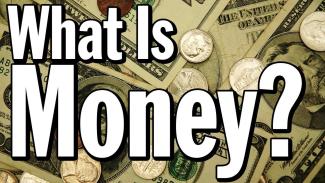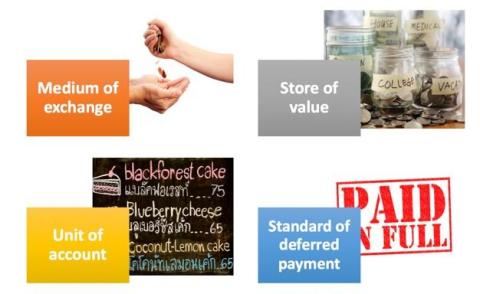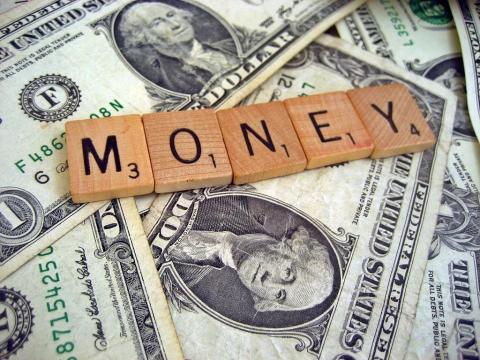
What is Money?
We tend to have a general idea of what money is – it’s those lovely papery crisp notes we know can buy us certain things we desire in our lives. But what if there’s so much more to money that we haven’t thought about? We also know that without it, modern economies could not function.
I’ve been in the finance (money) industry for a good while now and I’ve seen my fair share of money woes. And what better way to educate our readers than by sharing the knowledge gained through my experience? Sure, I don’t know all there is to know, but I’m passionate about empowering people to be financially savvy and plan for their future financial peace of mind.
What is Money?
As a bit of a history nerd, I studied archaeology & anthropology in college (I wanted to be Indiana Jones) which is essentially the study of people, dead and alive. Part of my studies included the history of money, or its equivalent, and how it has evolved.
The invention of money took place before the beginning of written history and therefore any story of how money first developed is largely based on conjecture and logical interpretation. We do know from early written history that people started to use money instead of bartering to exchange it for things like food and services. It has certainly evolved since then with most of us now not even carrying cash with us anymore, being able to pay for everything with our credit cards and phones.
As we know, most people handle money daily, however, few people can tell you exactly what money is, or how it even works.
Money is a commodity that can serve as a:
- store of value - meaning people can save it and use it later
- unit of account, that is, provide a common base for prices; or
- medium of exchange, something that people can use to buy and sell from one another.
Can you imagine a world without money? Think for a minute how much would change if we didn’t have access to money. If we didn’t have money, we would go back to the days of bartering for goods. Mind you – I’m not sure that’s such a bad idea. I guess one of the issues that would arise would be figuring out a value to barter with. Say for example I took my car in for repairs – what would I use to ‘pay’ the mechanic? I’m guessing a dozen or so eggs wouldn’t quite cut it! Ultimately, in this day and age, I think many people might end up starving before being able to find the right person to barter with.
In light of the above, you can see how money makes our lives so much easier. All you need do is find a store that sells the good or services you require. No need to barter – instead we now exchange goods or services for a common medium of exchange i.e. money. But let’s explore the functions of money in more detail below.
FUNCTIONS OF MONEY
A Medium of Exchange:
In its simplest form, money is a medium of exchange for goods and services and allows you to buy and sell goods and services. We don’t think of money as having attributes, but they do! To act as an ideal medium of exchange, money should have the following attributes:
General Acceptability
Portability
Divisibility
Durability
Stability of Value
Consistency
A Measure of Value or Unit of Account:
At school, we all learned about units and denominators and this is exactly what money is – a unit of account. So, in effect, money is a common denominator, through which the exchange value of all goods and services can be expressed without difficulty.
Store of Value:
In its simplest form, money is a means of saving. How you might ask? Well, think of money being a repository of purchasing power over time. A store of value i.e. money is used to save purchasing power from the time income is received until the time it is spent.
Standard of Deferred Payment:
If we had a moneyless economy, lending and borrowing would come to a screeching halt! With the advent of money, borrowing and lending have become so much easier. Moreover, with the expansion of trade and commerce based on credit, money has become a standard of deferred payments. Deferred payments are those that are postponed for the future and money enables current transactions to be discharged in the future.
History of Money
Where did money begin and where did it derive from? History tells us that money was one of the earliest and most significant inventions of civilization and was essential to the development of trade. As mentioned earlier on in this blog, if there was no monetary system, we would barter for goods.
It would seem the most primitive form of money was shells, referred to as cowries and wampum. Both shells became the market currency, in the conventional sense, but only after the arrival of the Europeans.
Source: www.pinterest.com
- 10,000+ years ago – barter was the first method of trade and pre-dates money.
- 9000 – 6000 BC (Cattle) - Cattle is considered to be the first form of what’s considered money.
- 1200 BC (Cowrie Shells) – China was the first area of the world to use these shells as money.
- 1000 BC (First coins) – Near the end of the Stone Age, China began making imitation cowries out of bronze and copper, which are base metals. These are considered by many to be the earliest form of metal coins.
- 500 BC (Modern coins) – In other parts of the world, round coins were developed out of lumps of silver and stamped with different gods and emperors depending on the location.
- 100 BC – 1800 AD (Various other items are used for money) – Even though coinage as we know it began around 500 BC, other items were used as money too. Leather in the form of white deerskin was popular in China.
- 1792-1816 AD (The Gold Standard) – Although the U.S. began tying its currency to precious metals with the 1792 Mint and Coinage Act, 1816 is considered the seminal year, which is when gold was adopted as the official standard of value in England.
- 1930s AD (The Great Depression and the End of the Gold Standard) – The coming of the Great Depression brought major changes in money and is considered the beginning of the end for the gold standard.
- Present day and the future – Since the early 1970s, the U.S. and most of the world have used a paper-based currency whose value is regulated by a central bank. International monetary regulations are complex at best and downright impossible to understand at worst. Many feel this standard has brought unbridled monetary expansion, eroding value, stagnant wages, and more.
Source: https://www.providentmetals.com/knowledge-center/precious-metals-resources/history-of-money.html
The Four Different Types of Money
The four most relevant types of money are commodity money, fiat money, fiduciary money, and commercial bank money
Commodity Money
This is the simplest and most likely the oldest type of money. This type of money is closely related to and originates from a barter system. The important thing to note about commodity money is that its value is defined by the intrinsic value of the commodity itself. In other words, the commodity itself becomes money. Examples of commodity money include gold coins, beads, shells, spices, etc.
Fiat Money
Now Fiat money derives its value from a government order, meaning the government declares fiat money to be legal tender requiring people and firms within the country to accept it as a means of payment. Unlike commodity money, fiat money is not backed by any physical commodity. By definition, its intrinsic value is significantly lower than its face value. Hence, the value of fiat money is derived from the relationship between supply and demand. Most modern economies are based on a fiat money system. Examples of fiat money include coins and bills.
Fiduciary Money
Fiduciary money depends for its value on the confidence that it will be generally accepted as a medium of exchange. Unlike fiat money, it is not declared legal tender by the government, which means people are not required by law to accept it as a means of payment. Instead, the issuer of fiduciary money promises to exchange it back for a commodity or fiat money if requested by the bearer. As long as people are confident that this promise will not be broken, they can use fiduciary money just like regular fiat or commodity money. Examples of fiduciary money include cheques, bank notes, drafts, and most recently cryptocurrencies like bitcoin.
Commercial Bank Money
Commercial bank money can be described as claims against financial institutions that can be used to purchase goods or services. It represents the portion of a currency that is made of debt generated by commercial banks. More specifically, commercial bank money is created through what we call fractional reserve banking. Fractional reserve banking describes a process where commercial banks give out loans worth more than the value of the actual currency they hold. At this point just note that in essence, commercial bank money is debt generated by commercial banks that can be exchanged for “real” money or to buy goods and services.
How is money important?
Money dictates the flow of human living in the modern world. Without money, life is often difficult and painful. It helps to create freedom. I’ve seen both want and abundance of money in life, and I can say one of the most depressing times in life is when people are without money.
The importance of money
We all need money to survive, bottom line. The ownership of money is itself a resource and the usage of it can help to acquire resources. Everything we use has monetary value and the power of money is indisputable!
Money can buy you happiness.
It’s not a difficult concept to fathom that money can buy happiness. Gauge your own emotions and state of mind when your bank balance is in surplus versus when it’s depleted. Something I like to impart to my readers and clients is that money is not the root of all evil – it is greed and the desire for power and authority. Money helps to eliminate wants in life, especially if the wants are related to commercial and even human interaction, as most human interaction in the modern world is now commercialized.
Money can buy your health.
Look, you cannot rule your health, nor can you predict certain diseases. You can, however, with the aid of money maintain a healthy lifestyle by purchasing nutritious food, working out, or taking medication.
The world can be a crazy place, it’s a commercial jungle, and emotions, feelings, and attachments are often a commercial investment. So, understanding that money can be your best friend and allow you to have a happy and successful life is something to take seriously. Becoming money savvy will most certainly put you in good stead and ensure your financial success is exactly just that – successful!
Thank you for reading!
Cheers
Derek Notman




